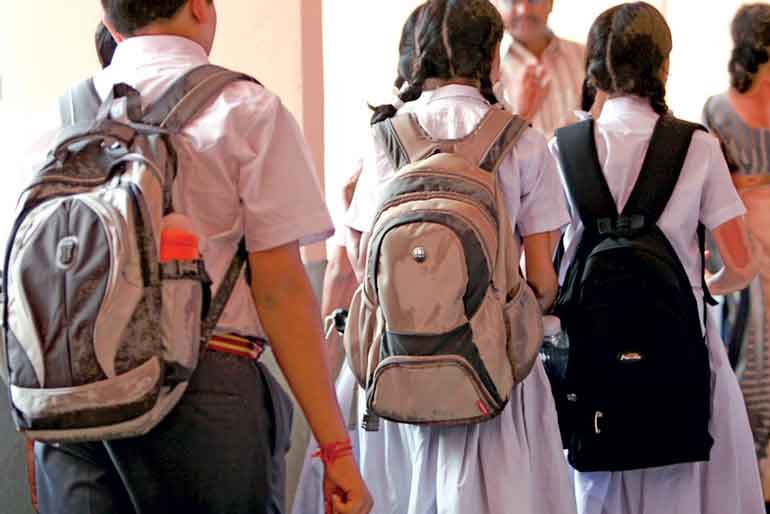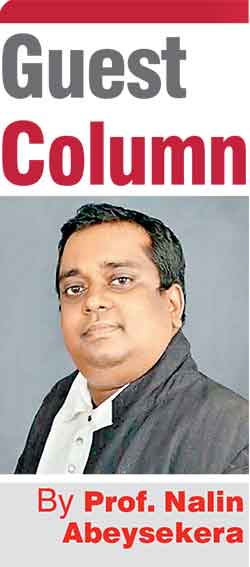Thursday Feb 19, 2026
Thursday Feb 19, 2026
Tuesday, 22 April 2025 00:54 - - {{hitsCtrl.values.hits}}

The school bag problem can be considered as only part of the real problem in education in Sri Lanka
 We see numerous discussion forums, experts, and other interested parties actively talking about our education system. Still, it’s sadly common to witness a child weighing just 24 kilograms struggling under the burden of a 10-kilogram schoolbag. I consider this as one measurement to indicate the disaster of our education system. Most of the children coming under the category of grade six to 10 have around eight subjects per day questioning whether Sri Lankan educationists have done justice for our next generation.
We see numerous discussion forums, experts, and other interested parties actively talking about our education system. Still, it’s sadly common to witness a child weighing just 24 kilograms struggling under the burden of a 10-kilogram schoolbag. I consider this as one measurement to indicate the disaster of our education system. Most of the children coming under the category of grade six to 10 have around eight subjects per day questioning whether Sri Lankan educationists have done justice for our next generation.
In India, the Ministry of Human Resource Development (HRD) prescribed a weight limit for school bags for each class last year. Accordingly, the weight of school bags for students of classes one and two should not exceed 1.5 kg, while the school bags for students of classes three to five should weigh between 2 kg to 3 kg. The school bags of students of classes six and seven should not be more than 4 kg, while the weight of school bags of classes eight and nine students should not be above 4.5 kg. The school bag of a class 10 student should not weigh above 5 kg.
The school bag problem can be considered as only part of the real problem in education in Sri Lanka. There is a grave need for a major reform in the education system in Sri Lanka in many aspects. But up to now, Sri Lanka has failed to have a proper comprehensive situational analysis of school education and university education. Experts need to take many equations in this context such as:
1.Government and private schools/universities and curriculum and quality
2.Equity and inclusion: Analyse disparities in educational opportunities among various socioeconomic, ethnic, and gender groups.
3.Infrastructure and resources
4.Governance and policy framework
5.Teacher training and deployment
6.Labour market alignment
7.Access and enrolment
Also, we can see from time to time that different topics such as “SAITM” are coming into action, but only temporary solutions are being given without understanding the root cause.
Proper situational analysis
Furthermore, several government institutes are involved in Sri Lankan education, with many repetitions of the same task, and we need to pay serious attention to this as well. By looking at the current scenario, the country needs to have an education reform but should have proper situational analysis. There can be some best practices that we can learn from other countries as well. World Bank also started to discuss the “Systems Approach for Better Education Results” (SABER). The expectation of SABER is to produce comparative data and knowledge on education policies and institutions, to help countries systematically strengthen their education systems (openknowledge.worldbank.org). Anyway, Sri Lanka needs to have careful consideration of different methods and approaches that align with the local context as well.
If you discuss Sri Lanka and education we need to remember Dr. C.W.W. Kannangara. As per Wuister (2018), Kannangara proposed the idea of free education, in which education would be free ‘from Kindergarten to University’, for every citizen of Ceylon. It meant that every pupil was free of paying any education fees. It took him 16 years of lobbying and advocating in the State Council before his plan of free education became a reality in Ceylon in 1945. The implementation of this free education scheme put an end to the social inequality that was inherently promoted by the colonial education system (Wuister, 2018). Now the time has come for the experts in the education sector in Sri Lanka to have an education reform to respect Dr. C.W.W. Kannangara and to ensure the sustainability of that noble duty of the “Father of Education”.
And also it is interesting to see the valid and applicable definition given for “Graduate” by Weliwitiye Sri Soratha Thero. Weliwitiye Sri Soratha Thero was a distinguished Buddhist monk and scholar renowned for his instrumental role in founding Sri Lanka’s Piriven University system and the University of Sri Jayewardenepura. Additionally, he was an accomplished author, translator, and editor of numerous Buddhist texts and scholarly journals. If we want to define a “Graduate” the Weliwitiye Sri Soratha Thero, pioneer of the University of Sri Jayewardenepura, offers great insight.
 Sri Lanka urgently requires comprehensive education reform, and it is essential to establish a dedicated task force to study, provide guidance, and oversee its implementation. This task force should include representatives from key sectors, including education, industry, religion, and other relevant fields
Sri Lanka urgently requires comprehensive education reform, and it is essential to establish a dedicated task force to study, provide guidance, and oversee its implementation. This task force should include representatives from key sectors, including education, industry, religion, and other relevant fields
Not merely to breed graduates
“It is our mission to present society with an intellectual, not merely to breed graduates. If one endeavours to transform this sacred abode into a place where degrees are sold, or one in which students are given degrees in a mere mechanical fashion, it will only lead the university as well as the country into disgrace. If our graduates have not proven the expected intellectualism their degree claims they possess, people will indubitably arrive at the conclusion that our university is a ‘store’ where degrees are ‘sold’. Thus everybody affiliated with the university should keep in mind not to engage in any act that will undermine the quality of our degree and research work.”1
Hence, one can argue that the mere usage of ‘employability’ in the definition of the graduate underestimates its true meaning. I would like to elaborate on the term “expected intellectualism” mentioned by Reverend Weliwitiye Sri Soratha Thero. An intellectual is a person who engages in critical thinking and reading, research, and human self-reflection about society. The key requirements of the intellectuals are not only thinking and reading but also human self-reflection. In other words, a graduate who has an Intelligence Quotient (IQ) and Emotional Intelligence (EI).
According to Forbes: “IQ tests are used as an indicator of logical reasoning ability and technical intelligence. A high IQ is often a prerequisite for rising to the top ranks of business today. It is necessary, but not adequate to predict executive competence and corporate success. By itself, a high IQ does not guarantee you will stand out and rise above everyone else.”
In this context, the concept of Emotional Intelligence (EI) is very important. According to Goleman (who is an author, psychologist, and science journalist; for 12 years, he wrote for The New York Times, specialising in psychology and brain sciences), EI is a construct that includes an array of positive attributes including political awareness, self-confidence, conscientiousness and achievement motives, rather than focusing only on intelligence that could help individuals solve problems effectively (Brackett & Geher, 2006). In his 1996 book Emotional Intelligence, Goleman argued that EQ (or Emotional Intelligence Quotient) might actually be more important than IQ.
A turbulent business environment demands that business practitioners study the market carefully. For this, one should have more imaginative power with creativity. A certain percentage of this can be considered as genetic. Nevertheless, one can also learn how to sense the business environment. Limiting oneself to only core subjects and prescribed materials at university can lead to becoming a mere machine, lacking the deeper sense of awareness and understanding — as emphasised by Rev. Weliwitiye Sri Soratha Thero.
Conclusion
Sri Lanka urgently requires comprehensive education reform, and it is essential to establish a dedicated task force to study, provide guidance, and oversee its implementation. This task force should include representatives from key sectors, including education, industry, religion, and other relevant fields. I believe the most essential ‘system change’ Sri Lanka needs can only be achieved in the long run by transforming the very DNA of its education system.
Footnote:
1Commemoration speech of Rev. Weliwitiye Sri Soratha Thero (http://www.sjp.ac.lk/news/commemoration-speech-on-rev-weliwitiye-sri-soratha-thero/
(The writer is a Professor in Management Studies at the Open University of Sri Lanka. You can reach him via [email protected].)